Thanks to our 443 supporters! ABR's grand total is currently at $10,827.51 since joining iGive.com.
Get your iGive button at https://www.igive.com/button/
Traveling this summer? Why not use iGive to plan your vacation and give to American Brittany Rescue?
Travelocity.com, the leading online travel Web site, provides reservations capabilities for 95% of all airline seats sold, more than 47,000 hotels, more than 50 car rental companies & much more.

Alamo Rent A Car is a value-oriented, internationally recognized brand serving the rental needs of airport leisure travelers.

Choice Hotels
2% Donation
Choice Hotels, includes Comfort Inn, Comfort Suites, Quality, Sleep Inn, Clarion, Cambria Suites, MainStay Suites, Suburban Extended Stay Hotel, Econo Lodge and Roadway Inn.

106 Supporters
$5,359.86 since joining
What is GoodShop?
We like to say that we have the most powerful coupons in the world.
Not only do we provide the best shopping deals on the internet, but we also make a donation to the nonprofit or school of your choice for almost every purchase you make. That's right: when you shop with Goodshop you don't just save. You also give, at no extra cost.
Search with GoodSearch and raise a penny with each unique click.
TOP SHOPPERS -
Michelle
Melissa
Joyce
Kristen
THANK YOU. Our top shoppers have raised $277 for American Brittany Rescue.
Father's Day Coupons available for websites like:
Amazon Smile has raised $4,345.32 since joining!
Do you feed your dog (or cat) Natural Balance? If so, you can help ABR! Natural Balance will issue a refund check directly to ABR for every 50 receipts with UPC's that we submit.
THIS IS IMPORTANT
 We must have both the store receipt showing the NB purchase plus the official UPC (the one that shows the flavor and bag weight, ie Sweet Potato & Fish, 28 lbs.).
For instructions as to where to send the receipts/UPC's and for any additional information you need.
|
The ABR printed newsletter Brittany Tales: For the Love of Brittanys wants your story. Our new masthead says it all and we have twelve pages for more stories! Did you rescue, transport, foster or adopt a dog from difficult circumstances? We often learn the first part of a dog's journey. Help us tell the rest of the story.
We would also like to share images, stories and artwork created by young family members who are inspired by our awesome dogs.
CONTACT US AT:
|
| HEALTH NOTES WITH DR. HEATHER |
It is a privilege to share our lives with our dogs. We are guardians of their well being from the puppyhood into their senior years. Each stage comes with its unique set of challenges. In the senior years we have to advocate for our dogs quality of life to maximize joy and minimize pain. Most concerns in older dogs involve concerns around mobility, vision, hearing, pain, senility, and incontinence. There are treatments and interventions that support many of the conditions seniors face to help them age as gracefully as possible.
Just like a retirement plan, you can invest in your dog's health in their later years. The biggest investment in improving a dog's aging is preventing obesity. An obese pet is predisposed to more illnesses and has a shorter life span. According to
Pet Obesity Prevention.org,
an obese animal is more likely to suffer from osteoarthritis, type 2 diabetes, high blood pressure, heart and respiratory diseases, cranial cruciate ligament injury, kidney disease, certain forms of cancer, and have up to a 2.5 year decrease in life expectancy. The extra weight doesn't just add a mechanical disadvantage, the presence of increased fat increases to production of inflammatory proteins. Reducing calories is a simple way to help pets have more comfort in their greater years.
Osteoarthritis is a familiar source of pain in older dogs. This is the most common concern when a dog is seen as "slowing down." If there are any changes in your pet's mobility or energy level it is important to have an exam done by a veterinarian. Often there is a degree of osteoarthritis occurring, however it is not the only reason a dog slows down. Metabolic illnesses and cancer can also cause dogs to slow down and they are treated differently. Early disease detection allows for more opportunities for intervention.
The best thing to think of when loving your senior dog is to support their comfort and quality of life, and this is based on each pet's' specific needs. There are many new interventions in assistive devices, medications, supplements, acupuncture, laser therapy, specialized diets that can help ease the discomfort and challenges of the aged pet. However, companionship, quality food, and a great home go a long way in providing support for our sweet silver Brittanys.
|
| PLANNED GIVING OPPORTUNITY |
American Brittany Rescue
is a
501(c)(3) organization. Our mission is to provide the leadership and expertise via a network of trained volunteers to take in stray, abandoned, surrendered and/or impounded purebred Brittanys, provide them with foster care, health and temperament screening, an opportunity for any necessary rehabilitation, and to ensure their health and placement into new homes.
Check our website to find more giving opportunities...
We would be honored to share your love and appreciation of our mission through your gift to our general fund, Brittany Buddy fund or a specific fund in keeping with our mission and/or location.
|
| DO YOU HAVE A BRITTANY STORY TO SHARE? |
We are always interested in your stories. Of course, we love the success stories, but we also want to hear about problems you and your Britt have worked through. How does your Brittany enjoy the upcoming holidays? (Memorial Day, Father's Day, and the Fourth of July are around the corner.) Any new adventure? Does your Brittany have any special talents? Send it all to [email protected].
|
 Follow us on Facebook for more great stories and photos! Follow us on Facebook for more great stories and photos!
|
|
| ABR Alumni Milo, 11 years old |
|
|
 |
|
These wonderful Brittanys are currently available for adoption.
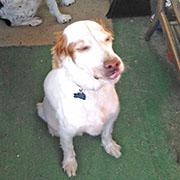 Oscar (California):
Oscar (California): This boy is a jewel! He may be 12 years old, but he is full of energy and typical Brittany antics. He currently shares his humans with 3 dogs and 3 cats, and he would really love to find a home of his own.
 Jackson (N. Carolina): 9-year-old Jackson has the exuberance of a puppy, which makes sense since he is making up for all he has missed out on life so far. He is looking for a loving, patient family to give him the second chance he so deserves! Jackson (N. Carolina): 9-year-old Jackson has the exuberance of a puppy, which makes sense since he is making up for all he has missed out on life so far. He is looking for a loving, patient family to give him the second chance he so deserves!
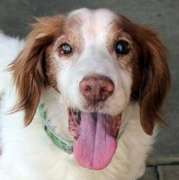 Sawyer (Missouri):
Sawyer (Missouri): Nothings gonna get him down! Sawyer is an enthusiastic Brittany, even though he is partial blind. It doesn't stop him from chasing squirrels. Sawyer is great with other dogs. He would be a delight and reward you with his lopsided smile everyday.

Ruby Rose (Iowa):
Ruby may be 14 years old, but don't tell her that! She loves to cruise the yard with the trot of a younger girl. Ruby is a quick learner who loves her daily walks. Having spent her life outside, she is now looking for a home where she can finally relax indoors with quiet company.
|
|
FOSTERING SENIORS:
A CALL FOR HELP & WHY IT'S WONDERFUL!
|
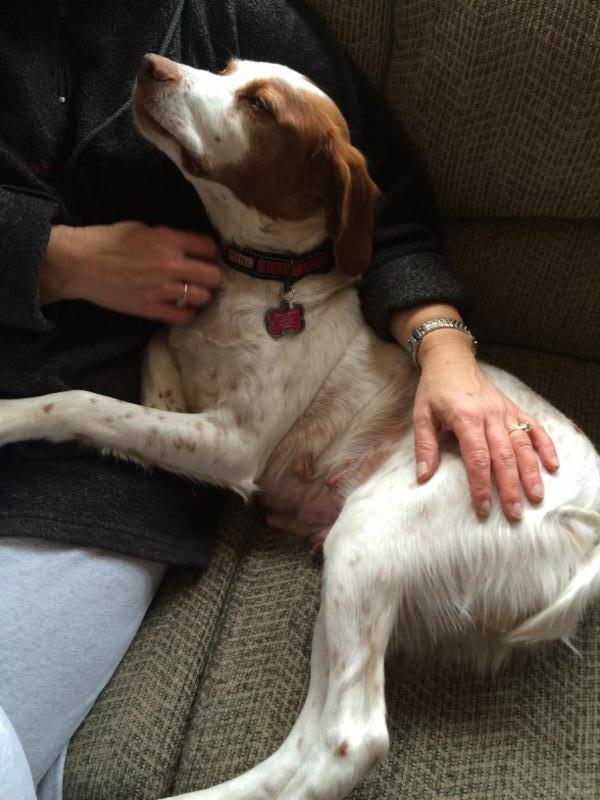
ABR's Needs Fosters Homes for Seniors
ABR currently has a vital need in each region of the United States and Canada for foster homes designated for senior fosters. While ABR had plans to develop a physical space in Illinois where senior fosters would be cared for and adopted out, the needs have changed since that program was launched. The good news is that there are not as many seniors coming through rescue as there were 10 years ago. However, there is still a great need for foster homes when ABR does get the call to help a seasoned Brittany. With designated homes for senior Brittanys, ABR can be ready to help these very special dogs. Because seniors tend to stay in rescue longer and can carry a greater financial burden than younger ones, ABR will cover the costs of vetting (within the guidelines), food, and items such as leashes, collars, and bedding. These seniors will still be posted to our website and adopted out if possible.
"Fear not!" and a Few Additional Words of Encouragement from a Senior Foster Parent
If you have hesitations about adopting seniors, you are not alone. However, along with serving a need within the ABR community, the experience can be incredibly rewarding personally.
ABR volunteer Scot Orsic began fostering seniors with ABR in 2011. In this written interview, he shares his experience and encouragement.
1) Why did you become a foster parent with ABR?
We began fostering to give back to the organization that had provided two great additions to our family.
Our first adoption occurred because our then four-year-old daughter wanted a dog for Christmas. This was the only item on her list. With both parents working, a puppy was not an option. I had a previous experience with a Brittany so I looked up Brittany rescue. We went through the process, but we had some challenges: a 9-month-old baby and a cat. We put a box of dog treats and a collar under the tree with a note from Santa that his Elves were searching for just the right dog for our daughter Natalie.
Around April, we got the call. A week later ABR volunteer Betty Headquist, adorned with an elf hat and green tights, was at the door with our first adoption, Patches. When Patches entered the house, she walked right into the brand new crate we had in the middle of the floor. Our son who was 13-months-old by this point, crawled right in after her. It was a tense moment and everyone held their breath, but nothing happened they just checked each other out. Patches was with us for the next seven years. Unfortunately, she contracted SARDS and went blind. We learned all we could about blind dogs and she adapted, as did we. She lived two years with the disease, and in the end the disease overtook her.
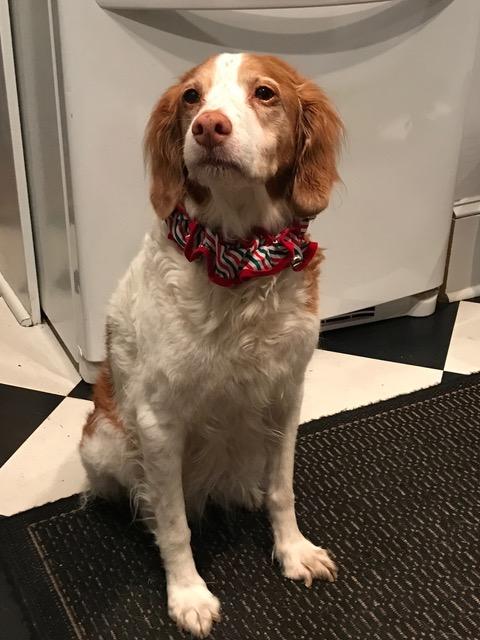 We lasted all of two months before searching the website for a new dog to adopt. We visited three dogs and we settled on one of the Putnam County Britts. We met Frank and Della Fabian, long time supporters, and adopted what we thought was a small 32-pound three-year-old male named Emmett. Little did we know that with love and good nutrition he would grow three inches taller and two inches wider into a 45-pound active boy. We lasted all of two months before searching the website for a new dog to adopt. We visited three dogs and we settled on one of the Putnam County Britts. We met Frank and Della Fabian, long time supporters, and adopted what we thought was a small 32-pound three-year-old male named Emmett. Little did we know that with love and good nutrition he would grow three inches taller and two inches wider into a 45-pound active boy.
Later that year, Christmas was approaching and I got notice of an older female who had been placed in a drop box at a shelter in Kentucky. My wife was feeling a bit down and decided that we needed to do something for the season that was not based in materialistic giving. We talked as a family. We agreed to foster a 13-year-old lady name Laurie. Laurie was a joy to have. My wife was smitten. She just wanted to be near the family and snuggle with someone if possible. We almost failed fostering 101. In the end when an older couple decided to adopt Laurie we came to the conclusion as a family, that if we could not give her up we would not be able to help any more dogs in the future. That single thought has been the basis of our approach to fostering going forward. Giving up the dog to their forever home allows us to help another.
2) How many Brittanys have you fostered? And how many of those have been seniors?
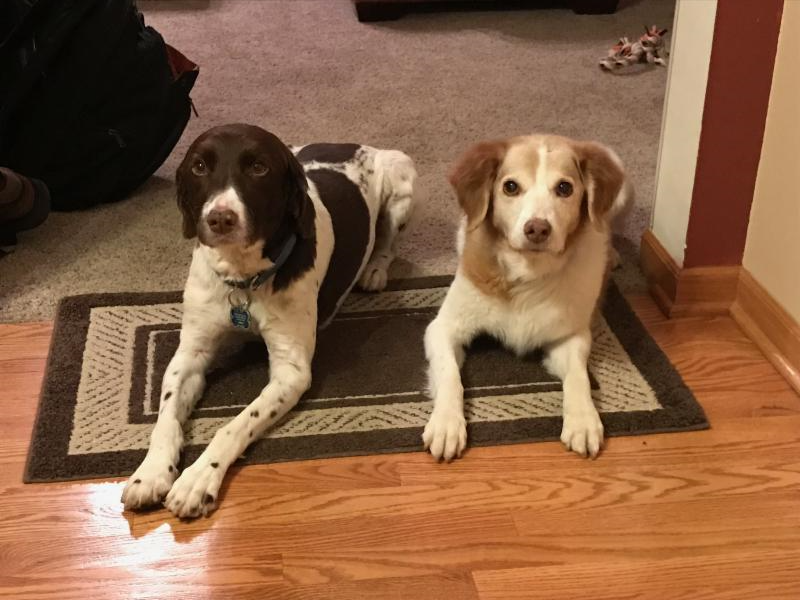 We have since fostered another six dogs, and we have found homes for every one of them. All of these except one have been senior females. They have all been without any major issues. We did have one that was an expert counter surfer, but other than that, we really have not had any bad experiences. They have all been able to co-exist with our male. I would say that bringing in females has avoided any territorial issues with our resident male-- a great tip from Frank Fabian. Today whenever we see an older female, we think here is our next foster. I think our state coordinator knows if nobody steps up immediately, she can count on us. We have since fostered another six dogs, and we have found homes for every one of them. All of these except one have been senior females. They have all been without any major issues. We did have one that was an expert counter surfer, but other than that, we really have not had any bad experiences. They have all been able to co-exist with our male. I would say that bringing in females has avoided any territorial issues with our resident male-- a great tip from Frank Fabian. Today whenever we see an older female, we think here is our next foster. I think our state coordinator knows if nobody steps up immediately, she can count on us.
3) What do you find rewarding about fostering seniors?
I believe one of the most rewarding aspects of fostering a senior is that they seem to know they have been given a second chance. All of our fosters have been loving and friendly. Our most recent foster was just a month shy of 15 years old. We found a family that had two dogs and had recently lost one to old age. The surviving dog was depressed. When the foster joined the family the other dog perked up. The adopters were amazed at how well they walked together and bonded so quickly. Other families have sent us Christmas cards with updates on how well the adopted dogs are doing. Another family has called and left voicemail messages to tell us how much they are enjoying the new family member. It's nice to hear that you have made not only the dog's life better but someone else's life better as well.
4) It can often be more difficult to find a forever family for seniors. Do you have tips for other foster parents with seniors on helping these dogs find homes?
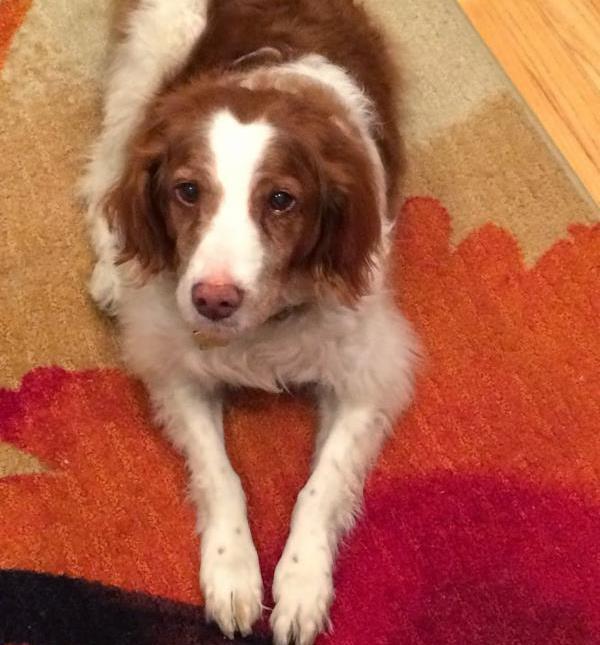 I don't think we have had too much difficulty finding the forever family for our fosters. The longest time frame we encountered was about nine months. Many have been placed within two months of being posted on the website. We don't worry much about not being able to find a home. We like having two dogs in the house. If we ever do decide to keep one of our fosters, we won't be able to help another. I think two is our limit. I don't think we have had too much difficulty finding the forever family for our fosters. The longest time frame we encountered was about nine months. Many have been placed within two months of being posted on the website. We don't worry much about not being able to find a home. We like having two dogs in the house. If we ever do decide to keep one of our fosters, we won't be able to help another. I think two is our limit.
From a tips perspective, I think one of the best options is to have the dog professionally groomed. Many times these fosters come in and need a spa day. We have them bathed, and have the feathering and nails trimmed. On occasion, we have even had a complete shave, bringing the coat length down to 3/4 inches.
Then feed them a good diet. If they are overweight put them on a diet and give them some exercise. The recent 15-year-old came in weighing over 50 pounds. We got her weight down to 40 pounds relatively easily and had her walking up to three miles. It was quite amazing to see how much more energy she had once she dropped the weight. When they don't look or act like an older dog, potential adopters are more receptive.
5) What words of encouragement do you have for someone who is considering becoming a senior foster family?
For future foster family's who are nervous about a senior Britt I would say... Fear Not!
There are many benefits.
First a senior Britt is not as likely to be as energetic as a junior Britt. You don't have the running and chasing around the house, jumping over furniture, and wrestling in the family room.
Second, they have demonstrated to us the ability to adapt easily into the family. They fall into routines quite easily following the lead of the resident dog. You can train an old dog new tricks, especially when the other dog is getting more treats.
Third, they really seem to demonstrate their appreciation for what you have done.
Finally, they give you a glimpse of the future if your resident dog in on the younger side!
*****
Can you help?
If we have convinced you of the rewards of fostering seniors and you are interested in signing up as a designated foster parent for seniors, please complete our
volunteer application
. Thank you so much for considering this vital need within ABR!
|
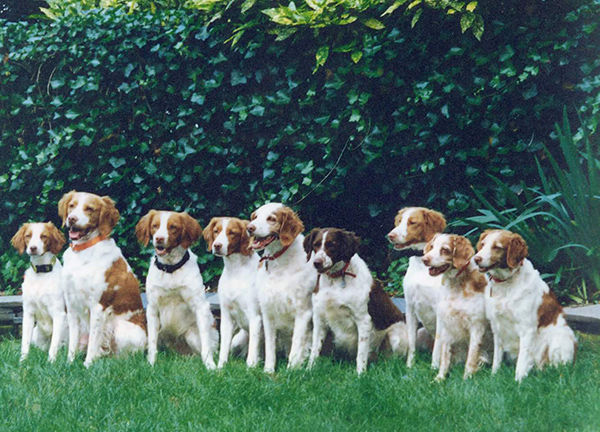
Congratulations to these Brittanys who joined their forever families over the last month!
Brinley, CA
Brody,MD
Boomer, TX
Buddy, PA
Buddy, IL
Carra, SC
Cinnamon, MD
Darby, TX
Georgie, WI
Gunnar, SC
Hagen, TX
Jeff, KS
|
Lady, MN
Leo, IN
Maggie, MN
Molly, NY
Mowgli, MA
Riley, NY
Rusty, FL
Rusty, CA
Scotti, OR
Sunny, TX
Turkish, OH
|
|
FROM THE PANTRY: DOG SHAMPOO
|
Yes, you read it right. It has been a wet and muddy spring in central Indiana and our Britt Bandit loves his mud puddles. Unfortunately, some of those puddles have been around for a while and are no longer spring shower-fresh, making them oh-so-appealing for our boy. We are also surrounded by cultivated agricultural fields where planting season includes application of chemicals that can be carried by wind and water. Fleas and ticks are already abundant. The pollen count has hit the moon and grass is tall. Frequent baths are not uncommon.
We find frequent bathing with some commercial dog shampoos can caused skin irritation and/or dryness so I went in search of a recipe that contained ingredients I could pronounce and that I had in the pantry.
Things as simple as vinegar and baking soda show up as components in many a homemade dog shampoo recipe. Standard baby shampoo or nontoxic dish soap is often incorporated into a homemade dog shampoo recipe to bind ingredients together. These recipes are very simple and require minimal preparation.
Homemade Flea Shampoo
Several recipes are available for homemade dog shampoo for fleas. This one is not only very simple to concoct, but is also ideal if you dog has sensitive skin!
This homemade flea shampoo for dogs requires:
- 1 quart of water
- 1 cup of white vinegar or apple cider vinegar*
- 1 cup of baby shampoo or nontoxic dish soap (many sites recommend Ivory or Dawn by name)
*If you are concerned about the acidity of white vinegar, apple cider vinegar is a bit milder. Remember to keep it away from eyes as it can sting.
For a lower-volume homemade flea shampoo or for a smaller dog or puppy, try:
- 1/2 cup of water
- 1/4 cup of white vinegar or apple cider vinegar
- 1/4 cup of baby shampoo or nontoxic dish soap
Shampoo for Sensitive, Dry or Itchy Skin
Adding ingredients such as aloe vera gel or glycerin can help relieve itchy and dry skin. Glycerin is a sugar-based, water-soluble alcohol compound, much less frequently found around the house than vinegar or baking soda, but can easily be found in drug stores, pharmacies, and online.
A typical recipe for homemade dog shampoos for dogs with sensitive skin involves:
- 1 quart of water
- 1 cup of baby shampoo or nontoxic dish soap
- 1 cup of white vinegar or apple cider vinegar**
**Some comments suggest using the vinegar to use in rinsing as it may react with the glycerin or aloe vera to create a slimy product that is more difficult to rinse from the coat.
Dry Shampoo for Dogs
Some dogs develop dry or itchy skin from more frequent bathing. One potential solution between traditional baths is a homemade dry shampoo recipe for dogs. Massaging a dry shampoo into your dog's skin will give the dog the sensation of being petted and caressed without the resistance you might face in the traditional wet bath scenarios.
Several homemade dry shampoo recipes for dogs also include baking soda. These tend to involve:
- 1 cup of baking soda
- 1 cup of corn starch
- A few drops of an essential oil -- lemon and lavender seem to be the most popular.
Sprinkle the mixture on your dog and massage it into the dog's skin with your hands or with a comb or brush. It is best not to use too much baking soda at a time - a cup for a mid-sized dog, half a cup for a very small dog or puppy - and not to apply this method too frequently, since the residue from the powder can accumulate, no matter how much a dog shakes himself afterward. A dry shampoo is a good stopgap, but nothing beats the fun of having your dog shake water all over you or your bathroom from time to time.
Adding Essential Oils
Although not necessary as the vinegar aroma will usually disappear when the dog's coat is dry, a few drop of tea tree, lemon or lavender essential oil can be added. Essential oils should be researched and tested on one little area of your dog to make sure there will be no allergic reaction to adding it to shampoo. (Remember to dilute the oil when you test!) If your dog has dry skin.
Some material excerpted from Dogster.com.
|
|
|